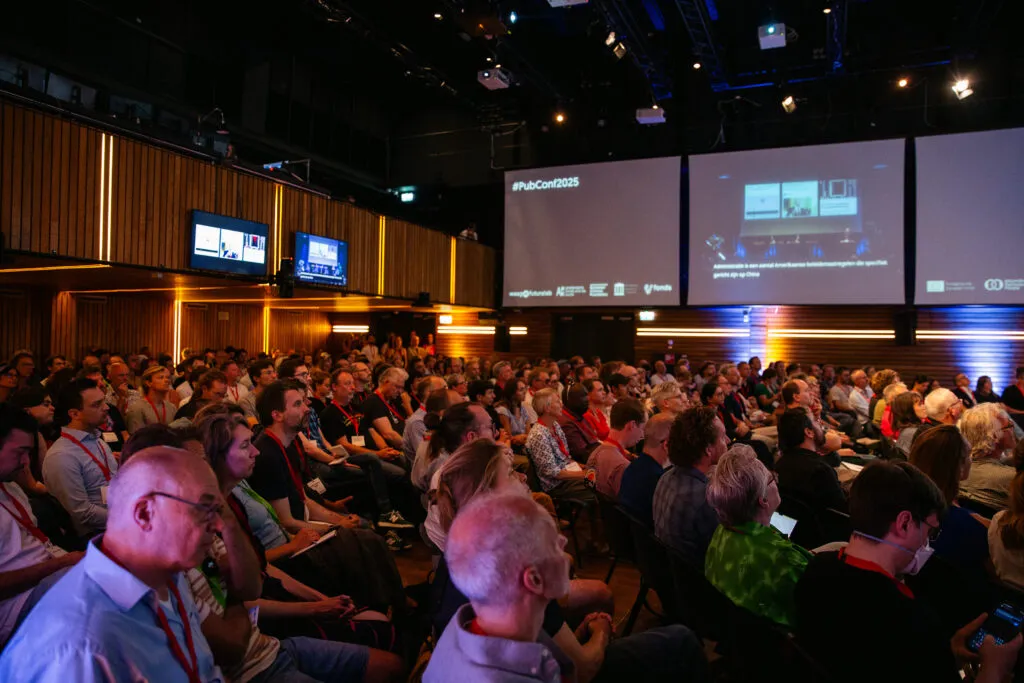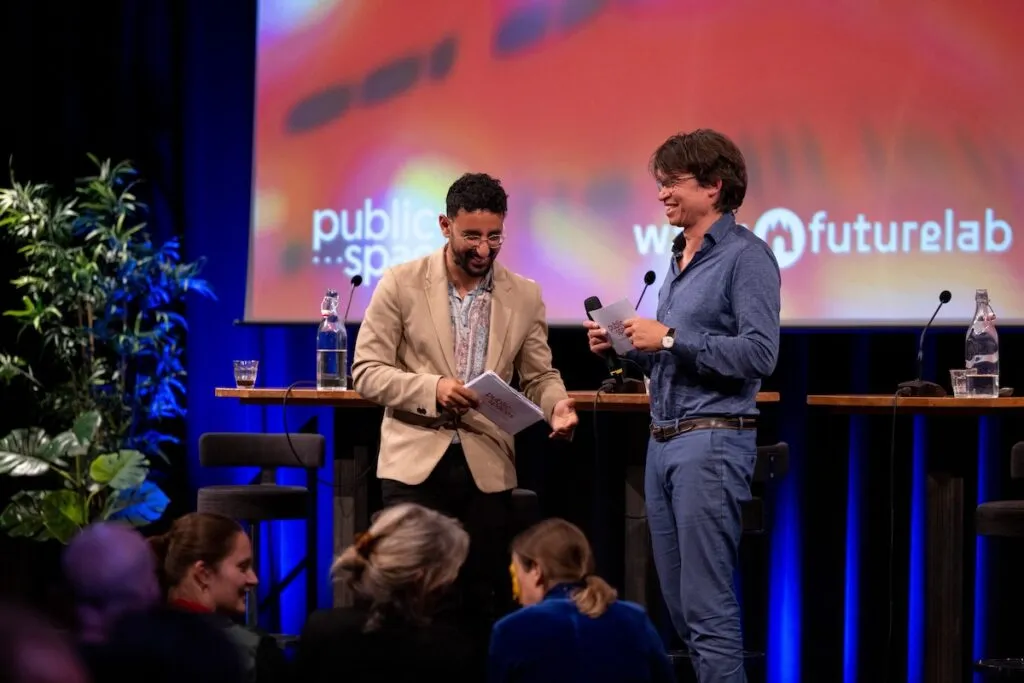Now that PublicSpaces has celebrated its second anniversary, it is worthwhile to document our experiences and share what has been the best working method for the coalition so far.
PublicSpaces is a coalition of values, built on a shared concern about the state of the internet. This concern is not only abstract and ‘far away’, but also applies to the position of the participating parties proper. They all ask questions like: how can we use the internet in a way that is consistent with the values of our organisation and with public expectations? What is our own responsibility in this? What should we change in our own organisation and operation? And what tools do we have at our disposal to do this? These shared concerns and dilemmas form the basis of the collaboration.
Sharing values alone is not enough to create a successful coalition. You can agree on what you think is important, but if you subsequently disagree on how to achieve your goals, you have not made any progress. A certain shared view on the form of collaboration and realistic expectations of what the outcome may be are at least as important for success.
The basis of the collaboration within PublicSpaces can be summarized in these ten points.
1. Agreement on the analysis
In large parts of the world, the main services offered by the Internet are dominated by parties with a single objective: maximize shareholder value. In other parts of the world, governments use the Internet to monitor their populations and spread propaganda. Both paradigms are not primarily tailored to the interests that we usually put at the centre of our modern society: democracy, freedom of speech and privacy, for example. This means that in practice the political, social, and psychological costs of using ‘free’ services on the internet are unacceptably high.
The objection that Big Tech, as evidenced by its economic success and size, knows very well what social goals need to be served and what the needs of the end user are, does not make sense. The social and individual costs of trolling, fake news, Internet addiction and loss of privacy are barely borne by Big Tech, and all the more by society and its citizens.
2. The importance of the network
The temptation is great to throw in the towel and think that you can’t fight the dominance of Big Tech. This is certainly true for every single coalition party. But together, we can make a fist. Because of the diversity of the participants, the PublicSpaces coalition collectively reaches more than 70% of the Dutch population, where it originated. There is certainly progress to be made, but the larger the scale, the more effective PublicSpaces can operate. That is why PublicSpaces also strives for a European strategy. Europe has a tradition of providing public services, with public funds, by private and semi-public parties that can operate autonomously thanks to legally guaranteed independence. The realisation of this European model, applied to the important services (e.g. Internet search, document sharing, navigation, publication systems, etc.) offered by the Internet, we see as the main goal for the PublicSpaces coalition. PublicSpaces can be abolished when Europe is no longer dependent on parties that are not committed to the public good for this type of important services.
3. In search of the commonality, part 1: the dilemma
Parties that join PublicSpaces all face the same dilemma. They were founded to provide public services and operate on the basis of a specific mission and vision, in which in many cases the quality of that public service is paramount. But in order to deliver those public services properly, they sometimes have to trample on their own values. They use Facebook, Instagram and YouTube to reach their audiences, they post Google Maps on their contact pages, and they use Google technology to measure how their audiences respond to their digital publications. Big Tech from Silicon Valley is the dominant provider of these services. The profit maximization that Big Tech is looking for, and the products that are provided for it, are difficult to relate to a vision in which the public interest is paramount. They are increasingly drawn to this ambivalence by their own public, who can sometimes experience this practice as hypocritical. The demand for alternatives is thus becoming more and more urgent.
4. In search of commonality, part 2: the greatest common denominator
You can dwell for a long time (and we did at PublicSpaces) on ethics, basic principles, working methods and technical frameworks. But such a discussion is not terribly productive in the end. Much more effective is to acknowledge at an early stage that you don’t necessarily have to agree on what exactly the SMART formulated end goal of PublicSpaces is and which technology should be used to achieve it. This ‘agreement to disagree’ allows you to shift the focus to the search for practical questions and solutions. PublicSpaces does not strive for ideological truths or pure discourses, but for the deployment of workable alternatives to the important functionalities that the internet offers – as long as these are not currently delivered in accordance with the public values that PublicSpaces propagates.
5. Starting from one’s own strength, part 1: reach and market power
The PublicSpaces coalition has a huge reach and has therefore a somewhat easier time to create network effects. At the same time, it generally lacks the resources to invest in the autonomous development of software alternatives, such as those offered by Big Tech, for example. Tens of billions are involved in this industry; innovation budgets alone sometimes exceed the ICT budgets of many a nation. PublicSpaces has therefore chosen to rely on the power of open source software (OSS). Good, or at least promising, alternatives are available for many functionalities. However, these alternatives are hardly known to the general public and service providers and are therefore only occasionally used. The coalition consists to a large extent of A-brands and therefore has the reach and market power to ensure familiarity.
With a joint effort, the parties behind PublicSpaces can create the network effect needed to give these alternatives a real chance. These parties also have the experience and knowledge of the public that some OSS providers lack and need to give their product just the latest quality boost, in usability and design for example, that is needed to make it a success.
6. Starting from one’s own strength, part 2: celebrating diversity
The coalition has a broad structure: it consists of parties active in the media, health care, the world of cultural heritage and festivals. The coalition will soon be joined by parties from the fields of education and the physical organisation of public space. Their diversity lies not only in their field, but also in their culture and traditions. This diversity can sometimes be complicated when it comes to developing a common language. But in the end, this diversity is mainly an advantage. It leads to the coalition having a very broad network in all layers of society. We have relatively easy access to the right resources within that network. Moreover, from this diversity we know for sure that we are making the right considerations in setting priorities; after all, the coalition partners reason primarily on the basis of their own needs, which together provide a complete range of functionalities.
7. Build partial coalitions under one PublicSpaces agenda
We do not aim to have all our partners participating in all our projects. On the contrary, we create partial coalitions on the basis of needs identified by our partners themselves. These coalitions are facilitated by PublicSpaces: PublicSpaces organises the discussion, brings the right people together, can provide different test environments, and helps in finding funds. Small product prototypes can be tested more easily and scaled up directly through the commitment of the partners.
By leaving the initiative with the partners, we also ensure that we always (continue to) develop only that which has a concrete need. We do not operate on the basis of a theoretical analysis, but on the basis of practical needs. By working in partial coalitions, costs per party can be lower and it is easier to share best practices with each other. The extra overhead associated with the coordination is borne by PublicSpaces.
8. Use the PublicSpaces name for public and political awareness
PublicSpaces’ external representation takes shape through its communication policy and through the involvement of well-known and strong brands of the coalition partners. But more importantly, we also have a mechanism to inform the public directly about the solutions we put in place to achieve our goals. We do this by means of the PublicSpaces Badges, digitally authenticated stamps that can be used on the websites and apps of PublicSpaces partners that meet the requirements. A badge is a clickable ‘seal’ linked to an implementation of OSS that complies with the PublicSpaces standards. This means that a click on a badge tells the end user, for example, how the wearer of the badge deals with privacy, with his cookie policy, or with tracking technology.
The badges are the public representation of the values of PublicSpaces, and immediately give an indication of the extent to which these values are realized by the badge-owner.
In addition, other types of activities aimed at public affairs and public awareness are organized under the PublicSpaces name. Conferences are organised, opinion pieces are written, presentations are given and network discussions are held.
9. Know what you don’t do – be complementary to other efforts
PublicSpaces is primarily concerned with the application layer in the technological stack – the products and services that target the end user. This means that underlying protocols and infrastructure do not belong to the domain of PublicSpaces – that is covered by organizations such as Solid, MIT, Mozilla, etc.
PublicSpaces also does not focus on the creation of new legislation or tax policy in the digital field. There are many other organizations that carry out professional lobbying activities in the European capitals and especially in Brussels. This is important work, but PublicSpaces chooses to leave it to others.
Finally, PublicSpaces is not an organisation that sets up campaigns to create more public awareness. Media literacy and awareness-raising about privacy and the like are set up by other, more specialised organisations.
10. Be prepared for a long haul
The task PublicSpaces has set itself is great, the ambitions are correspondingly high. The objectives will not be achieved within one or two years. It took us 25 years to break the internet and we are only now beginning to become aware on some scale of what digital ethics actually means and what standards we would like to set online. We must prepare ourselves to take many years to reach our goals. This means that we must also be prepared to take an extra step in terms of professionalization if necessary.




